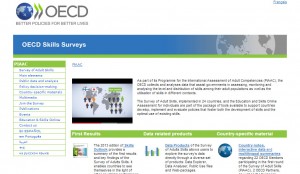The Results of OECD Adult Skills Surveys
These are very interesting and important results. I especially like the interactivity of the charts. I would recommend you to start with listening to their 3 min YouTube and then go and see their results of play with the data. I especially liked how they analyzed country’s performance by age… What does it mean that young Koreans do exceptionally well while older generation doesn’t and what about the UK? I think these results are very revealing… As I am exploring Canada, I am thinking what I can do as a STEM teacher educator and what should be done… Think for yourself… What does it mean that 22% of our adult population are at the very lowest level of numeric literacy (in other words, they are incapable of making sense of numeric information)? How can this happen in the age, where being numerically illiterate presents huge disadvantages: think of you bank account, RRSP, mortgage, saving, deciding to buy or lease a car or even making your ends meet and understanding how to balance your income with your expenses? And what about or understanding the bigger issues of the day, such as global warming, financial crises, or anything else number-related… How can a highly developed and wealthy nation such as Canada has 22% of its population being numerically illiterate! What kinds of jobs will these people will be able to get? How will they educate their own children? How will they be able help their kids in school? But most importantly, HOW CAN WE HELP THEM – THESE CANADIAN ADULTS who didn’t have this opportunity to become literate – who fell between the cracks of our education system? What can we do and how much will it cost our society to continue ignoring this problem? Lastly, by taking 22% of our population out of the talent pool of people who could have become engineers, technicians, and other STEM-related specialists, we are missing out on their talent. It is a missed opportunity happening right here in our home – in Canada…
And here is the excerpt about Canada…
Canada: Adult skills (Survey of Adult Skills, PIAAC)
- In Canada, the mean proficiency score of 16-65 year-olds in literacy is around the average of the OECD countries participating in the Survey of Adult Skills (PIAAC). In numeracy, the mean proficiency score is however significantly below the average.
- In Canada, the younger adult population (16-24 year-olds) scores significantly below the average in literacy of the OECD countries participating in the Survey. In numeracy, they score around the average. In both domains, younger adults score higher than their older counterparts (55-65 year-olds).
- In Canada, 10.4% of the adult population (16-65 year-olds) report no prior experience with computers or lack very basic computer skills. In contrast, 37% of the adult population score at the highest levels in problem solving in technology-rich environments, a proportion significantly above the average of the OECD countries participating in the Survey of Adult Skills (PIAAC).
- In most participating countries, a significant minority have a very low level proficiency in literacy and numeracy. This is also true for Canada, where 16.4% of the adults score at the lowest levels in literacy and 22.4% in numeracy.
